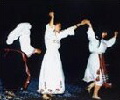 |
SUCHE |
 |
NAVIGATION |
 Fire dancing |
|
Fire-dancing called Nestinarstvo extends a bridge between the past and the future, and shows a tiny fragment of the cultural heritage of our nation. It is something unique and almost unknown though it has existed in the heart of Europe for centuries on. The phenomenon still remains unveiled; an enigma posing many unanswered questions.
Fire dancing is one of the oldest pagan rituals in the Balkans. It has defied the persecutions of both Christianity and communism to survive through the millennia. In a trance-like state, locals in the tiny Strandja village of Bulgari still dance barefoot on burning embers, just as their ancestors did thousands of years ago. They say: "One cannot be taught to dance over embers unless they were born to be nestinari (fire dancers). You should believe that God will keep you safe, you should be very good and wish evil to no one. Then you will not feel the heat". They also believe mental preparation and cold feet, along with the thundering, monotonous music of bagpipes and drum are key.
The performance begins at sunset, when the chief nestinar, a man wearing a white shirt and a red sash around his waist, spreads the embers in a circle in Bulgari's square.
The street lamps go off and the crowd approaches in silence. Only the drum echoes primitively across the mountains.
The nestinars dance around the circle, carrying icons and then suddenly walk through the fire. Their feet sometimes touch lightly and sometimes press down in hard circular motions, crossing the coals until they put down the blaze.
Their faces are pale and their eyes half-closed. Fire dancers say they fall into a spiritual trance during the performance and are believed to foretell the future.
Historian Valeria Fol at Bulgaria's Academy of Science, who has studied fire dancing since 1972, writes in her book "Fire and Music" about a prophecy she heard from a Greek nestinar in 1993, predicting last decade's wars in former Yugoslavia.
Anathematized by the Orthodox Church and banned by Bulgaria's communist government, fire dancing is traced back to the Tracians, Bulgaria's most ancient inhabitants who worshiped the sun and believed in immortality.
The fire dancers in Bulgari say they inherited the custom from their grandparents, for whom the ritual was a purely Christian duty. If they observed it they stayed healthy and harvested rich crops, if not, disease and poverty befell the community. |
|

|